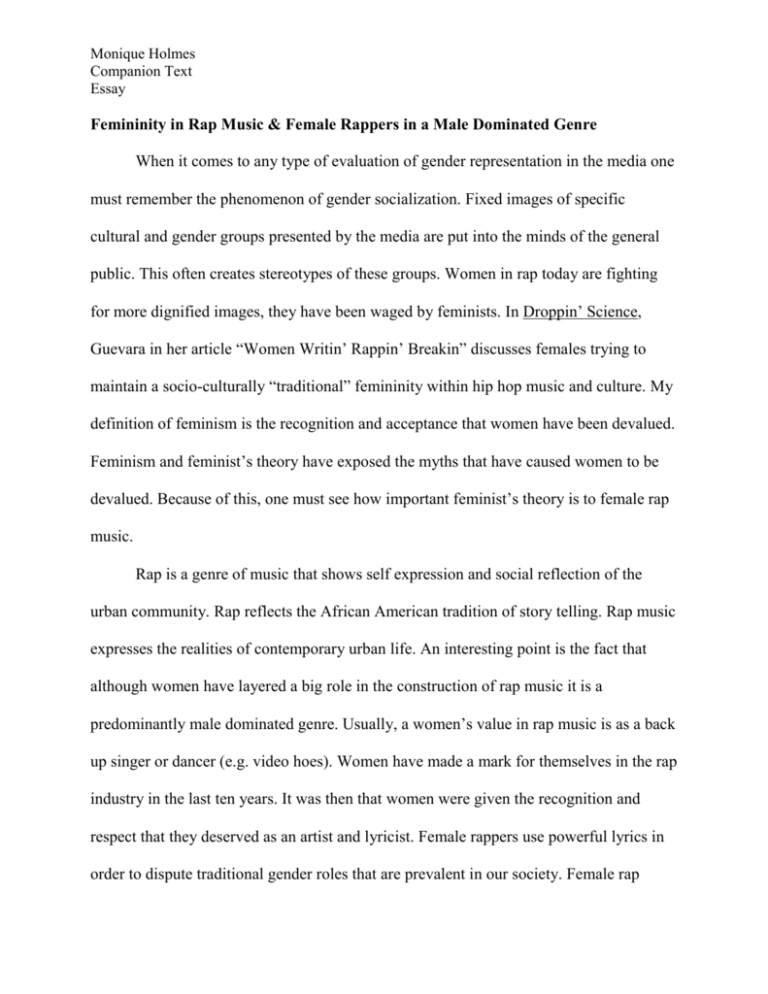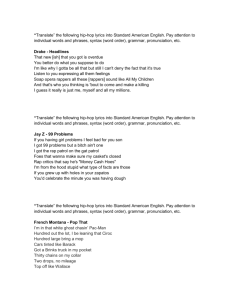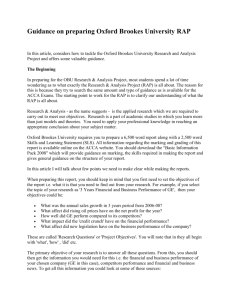
Monique Holmes
Companion Text
Essay
Femininity in Rap Music & Female Rappers in a Male Dominated Genre
When it comes to any type of evaluation of gender representation in the media one
must remember the phenomenon of gender socialization. Fixed images of specific
cultural and gender groups presented by the media are put into the minds of the general
public. This often creates stereotypes of these groups. Women in rap today are fighting
for more dignified images, they have been waged by feminists. In Droppin’ Science,
Guevara in her article “Women Writin’ Rappin’ Breakin” discusses females trying to
maintain a socio-culturally “traditional” femininity within hip hop music and culture. My
definition of feminism is the recognition and acceptance that women have been devalued.
Feminism and feminist’s theory have exposed the myths that have caused women to be
devalued. Because of this, one must see how important feminist’s theory is to female rap
music.
Rap is a genre of music that shows self expression and social reflection of the
urban community. Rap reflects the African American tradition of story telling. Rap music
expresses the realities of contemporary urban life. An interesting point is the fact that
although women have layered a big role in the construction of rap music it is a
predominantly male dominated genre. Usually, a women’s value in rap music is as a back
up singer or dancer (e.g. video hoes). Women have made a mark for themselves in the rap
industry in the last ten years. It was then that women were given the recognition and
respect that they deserved as an artist and lyricist. Female rappers use powerful lyrics in
order to dispute traditional gender roles that are prevalent in our society. Female rap
Monique Holmes
Group Project Section
Companion Text
2
music focuses on promoting women’s importance, which in turn demands equal
treatment for women and demonstrates the need for women to support each other.
Most women rappers didn’t get in the game because they saw themselves as
feminist warriors. A lot of women distanced themselves away from the perception that
they may be feminist. Of course, self expression was one of the reasons that women
wanted to rap but the main reason was the same as men, they wanted to know that their
lyrics was nice. Years ago, the male rappers weren’t too happy about sharing their space
on the mic with women rappers, so a lot of the earlier women rappers got played by
responding back to the male MCs. In Check It While I Wreck It, Pough argues that the
ignoring and silencing of black women’s voices in hip hop to larger societal issues. She
says “Black women’s speech and expressive culture have been limited in the public
sphere due in part to circumstances such as maintaining community, promoting black
manhood and constantly vindicating black womanhood against misrepresentation” (79).
She also says that black women voices have been “limited because the places in which
they have been allowed to thrive have been devalued” (79). She also chides the feminist
movement for its failure to take serious the voices of black women in hip hop. “Black
feminism needs to be accountable to young black women, saving their lives and widening
their worldview and the choices they feel they can make. In order to accomplish this, in
order to reach young black women, feminism needs to come down from its ivory tower.
Young black women like it or not are getting their life lessons from rap music (79).
Monique Holmes
Group Project Section
Companion Text
3
Many of the stereotypical images of women in hip hop are the idea that women
pursue sexual relations with young black men out o f material desire. Pough finds value
in women rappers like Lil’ Kim and Foxy Brown. She says “the sexually explicit lyrics of
these women rappers offer black women a chance to face old demons and not let the
stereotypes inform or control their lives. After years of black women being read as super
sexual, or asexual, in the case of the mammy stereotype- the lyrics of these women
rappers offer black women a chance to be proud of and indeed flaunt their sexuality(188).
Although men still constitute and control the vast majority of the commercial
industry, women rappers are emerging as a force. There isn’t really much of a difference
when it comes to the topics that women rap about. Just like male rappers denigrate or
objectify women, the women rappers do the same to men. An example of this would be
Salt N Pepper’s “Shoop” who was one o f the first women rappers to emerge into
commercial rap. A lot of the women MCs now demand to have the same respect that is
given to men. Ten years ago it was really difficult to tell the difference between the male
and female rappers. The female rappers had to hide their femininity in order to gain
respect in the industry by wearing combat boots and fatigues. But now, there is a new
generation of women rappers that are on the scene blandishing their sexuality. They are
now earning respect for their rhyming skills and at the same time picking up six figure
checks.
Monique Holmes
Group Project Section
Companion Text
4
Challenging male rappers predominance female MCs have not only proven that
they have lyrical skills. In their struggle to survive and thrive within this tradition they
have created spaces from which to deliver powerful messages from black female and
black feminist perspectives.
Women are achieving major strides in rap music by continuing to chisel away at
stereotypes about females as artists in a male dominated tradition and by redefining
women’s culture and identity from a black feminist perspective. Although, rap continues
to be predominantly male, female MCs move beyond the shadows of male rappers in
many ways. Some of these MCs have become exclusively known for their lyrical skills
while others have used musical styles such as a combination of singer-rapper acts such as
Lauryn Hill and Left Eye.
Women rappers still face overt sexism regarding their creative capabilities.
However, female MCs have defied the sexist repression by writing their own songs,
producing their own songs, and starting their own record companies. In 1993 Latifah
challenged males who use bitch/ho appellations in her song U.N.I.T.Y
The scholarly studies on female rappers only show a partial representation. They
tend to focus on female’s attitudes and responses to sexual objectification and ignoring
the many roles and issues of women and female rappers. Tricia Rose in Black Noise says
that female MCs should be evaluated not only with regard to male rappers and misogynist
lyricists “but also in responses to a variety of related issues, including dominant notions
Monique Holmes
Group Project Section
Companion Text
5
of femininity, feminism, and black female sexuality. At the very least, black women and
dominant American culture as they struggle to define themselves” (147).
In conclusion, female rappers convey their views on a variety of issues concerning
identity, socio-history, esoteric beliefs shared by young African American women.
Female rappers have attained a sense of distinction through revising and reclaiming black
women’s history and perceived destiny. They use their performances as platforms to
refute, deconstruct, and reconstruct alternative visions of their identity. Rap then becomes
a way for female rappers to seek empowerment and empower others.
Sexual Speech in Rap Music by Women Rappers
There are a lot of female rappers who us explicit sexual speech to turn the tables
on the men which allows them to be the dominant ones. Through these powerful lyrics
these women artists uses language and images which allows women to lessen their sexual
insecurities and inhibitions. These women rappers releases their desires rather than
repressing them as some think women do or should. This denies them from being
victimized. Through the use of these lyrics and style they are giving women a sense of
self identity and empowerment. Foxy Brown and Lil Kim’s over sexuality is a liberating
force. One of our society’s stereotypes is that if a girl prowls after sex, talks about a penis
and “rocks” a mini mini skirt then she must be a hoe. When Lil Kim came out wearing
Monique Holmes
Group Project Section
Companion Text
6
her mini skirts and minks other females followed suit allowing their femininity to show.
But Lil Kim and Foxy Brown were products of male fantasies. Kim later said in an
interview about her second album that “I’m not gonna totally change on my next album.
I’m gonna still be talking about sexual things but it will be deeper.” These women just
want to be on the same level as the male MCs. Foxy pointed out that when a women
wants to be paid the same as a man they are called whores “Double standards/Call me a
mack/Call me a hoe/Say I’m in it for the dough/what the fuck he in it for?” Missy Elliot
claims that she is cool when men call her a bitch because that is what women are called
when they demand control. “I’m a bitch in power and I think this is gonna be the year of
the bitches.”
What I’m noticing is that it’s not just the men in hip hop who brags of their
conquests. An example will be Missy’s “One Minute Man” to Tweet’s “Oops My.” The
women rappers and singers are definitely letting the men know that they too are getting
theirs. However, it was Lil Kim who has used sex as a way of establishing herself. This is
a strength of her feminist strength.
The power of these lyrics serve as a boost to a
women’s self esteem and it also erases the stereotypical attitudes that women should be
sexual submissive. A lot of women rappers use these explicit messages as a way to offer
alternative positive images of women that contradict stereotypical images that are
inflicted on African American women. Through the use of these lyrics these artists, such
Monique Holmes
Group Project Section
Companion Text
as Lil Kim and Foxy use language and images which can allow a woman to lessen her
sexual insecurities and inhibitions.
7
Monique Holmes
Group Project Section
Companion Text
8
Work Cited
Guevara, Nancy. “Women Writin’ Rappin’ Breakin’” Philadelphia, PA: Droppin Science.
William, Perkins, Temple University Press.
Kinnon, Joy. “Sister of Rap: Women rap artists” Ebony (1999).
Pough, Gwendolyn, Check It While I Wreck It. Portland, OR, 2004
Rose, Tricia. Black Noise: Rap Music and Black Culture in Contemporary America.
Philadelphia, PA: Temple University Press, 1994. 2-182.







